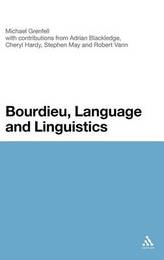
|
Bourdieu, Language and Linguistics
Hardback
Main Details
| Title |
Bourdieu, Language and Linguistics
|
| Authors and Contributors |
By (author) Dr Michael James Grenfell
|
| Physical Properties |
| Format:Hardback | | Pages:272 | | Dimensions(mm): Height 234,Width 156 |
|
| Category/Genre | Sociolinguistics |
|---|
| ISBN/Barcode |
9781847065698
|
| Classifications | Dewey:306.44 |
|---|
| Audience | | Postgraduate, Research & Scholarly | |
|---|
|
Publishing Details |
| Publisher |
Bloomsbury Publishing PLC
|
| Imprint |
Continuum International Publishing Group Ltd.
|
| Publication Date |
11 November 2010 |
| Publication Country |
United Kingdom
|
Description
Pierre Bourdieu is regarded as one of the foremost social philosophers of the twentieth century. His output included extensive studies of education, culture, art and language. This book sets out what Bourdieu has to say about language and why, and exemplifies this approach through a series of empirical language studies.
Author Biography
Michael James Grenfell has held Chairs at Trinity College, Dublin, Ireland and the University of Southampton where he is now based. He is also Adjunct Professor at the University of Canberra, Australia. He has an extensive background of research on Language and Linguistics, and the work of Pierre Bourdieu. He is the author/ editor of several books including: Modern Languages Across the Curriculum (2002), Bourdieu, Language and Linguistics (2011); Language, Ethnography and Education (2012); and Bourdieu: Key Concepts (2012).
ReviewsPierre Bourdieu was perhaps the most influential sociologist of the second half of the 20th century. Given that language was so central to his theoretical and empirical works, it is surprising that so few scholars have addressed Bourdieu's theory of language or the ways in which he studied it, its use, and linguistic capital in his empirical work. Michael Grenfell and his contributors have rectified this in comprehensive and insightful ways. Grenfell's wonderful introduction to Bourdieu's work and his theory of language is theoretically rich as well as accessible to those -- including many scholars who use Bourdieu in their own work -- who are unfamiliar with linguistic theory. This sets the stage for the practical and empirical contributions that demonstrate how researchers can use Bourdieu in their own language-oriented studies and how teachers can better understand the ways in which language works in their own classrooms. This book shows how an understanding of Bourdieu's theory of language is key to an understanding of his entire body of work and should inform all Bourdieusian research. In conjunction with his other books on Bourdieu's life and his theories of education and art, Bourdieu, Language and Linguistics establishes Grenfell as perhaps the most important scholar working on Bourdieu today. -- Dan Schubert, Associate Professor of Sociology, University of Dickinson, USA Bourdieu, Language and Linguistics is accessible, readable and scholarly - a welcome addition to the field. It provides a clear situating of Bourdieu's ideas, which will be particularly valuable to all those wanting to engage with and understand his theories and provides a sustained engagement with a particular field, that of language and linguistics. The book will be particularly useful to those working in educational settings, and those who want to engage with Bourdieu's theories to counter inequalities in education. This book celebrates Bourdieu's activism, his passion and his commitment to social justice in education, with language as the arena for this engagement. The power of words, the way their reality seeps in, is the subject of this book. We are asked as scholars to reflexively turn our gaze upon ourselves, and see language as embedded within social processes. The book offers a series of case studies which apply these theories to practical contexts. The case studies address language variation, and the way linguistic capital expresses itself in language, field research in Catalonia, Spain, an account of linguistic ethnography and the experience of language change in multilingual communities in the UK, debates over citizenship in relation to language policy and national identities, language and education policy and practice in the UK, with a final section on language as the object of study. These case studies are beautifully embodied illuminations of Bourdieu's theoretical contributions and offer a call to a more pluralistic and inclusive vision of language policy in action. In the final section of the book of the importance of reflexivity when thinking about language in education is stressed. If language is the medium of education, as Grenfell, and the authors of this book (and Bourdieu) would say, then this book is a must for all scholars of language in education, and those who would wish to understand and reflect on educational processes and practices. This book brings a passion, energy and commitment to that task that, as Bourdieu himself would do, challenges and contends with contemporary structures and debates in a lively and provocative manner. -- Kate Pahl, Senior Lecturer in Education, School of Education, University of Sheffield, UK
|